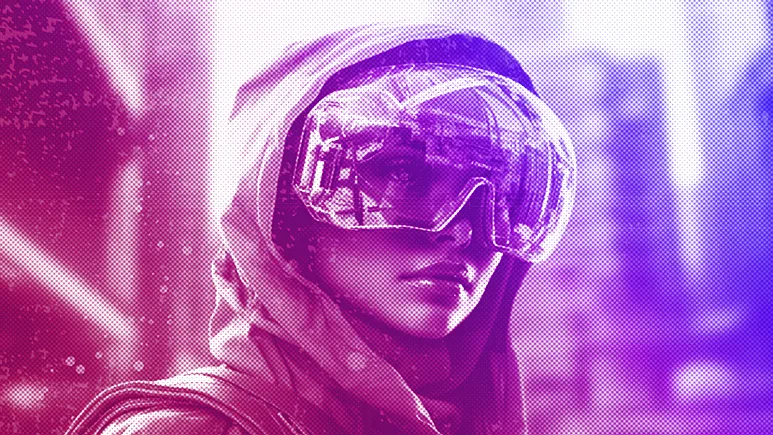Forget AI doomers and utopists. Keeping it real is our best bet
An illustration of a person wearing an AI-augmented device
By Fabrizio Fantini, CEO and founder, EvoPricing
Published on 08/08/2023 – 16:42•Updated 16:44
Share this article
Comments
The opinions expressed in this article are those of the author and do not represent in any way the editorial position of Euronews.
The public simply needs to choose truth over fantasy to protect humanity and end this misinformation war on AI, Fabrizio Fantini writes.
The AI arms race is causing typical political polarisation, with both sides seeing the tech in completely different ways.
As several experts pointed out already, you’re either an AI doomer or an AI utopist. Whatever team you’re on, you’re missing a big part of the picture.
AI won’t destroy our society, but we need an unbiased understanding of it to protect ourselves and unlock its power.
Could a sea slug really end humanity?
In 2023, most people are concerned that AI will steal their job or end humanity. Polarised AI articles are responsible for this unrealistic narrative.
They manipulate humans’ biological fear of the unknown. They exaggerate existing knowledge about AI developments that misrepresents the technology’s capabilities.
While generative AI has shown us its enormous possibilities, our inventions are far from perfect. That is something anyone who has played with these tools quickly understands.
AP Photo/Martin Meissner
Visitors watch flowing data sculptures at the exhibition “Refik Anadol. Machine Hallucinations” at the Kunstpalast art museum in Duesseldorf, May 2023AP Photo/Martin Meissner
The utopists think AI will solve every problem our world has while doomers think AI will rebel against us or actively intend to harm us. This is because both assume that AI is farther along than it is.
Yet, AI is still “closer to a sea slug than an all-knowing machine”.
Algorithms are task-specific, which means they take a long time to create. They can’t utilise random information for any task. They need more training and red team practice than many people understand.
While generative AI has shown us its enormous possibilities, our inventions are far from perfect. That is something anyone who has played with these tools quickly understands.
This is not the first major tech advance humanity had to deal with
The proliferation of nuclear weapons hasn’t eradicated human life on Earth as we expected. It could have, but people implemented regulations to prevent destruction.
They educated themselves on the topic and cooperated to protect humanity. We must do the same with AI. If people have concerns as AI helps us evolve, then decision-makers and the public should voice those opinions.
The discussion has already begun, as international policymakers are rapidly designing ethical regulations to deter bad actors.
Doomers and utopists are both advocating for stronger regulations and unbiased education on how AI can further our civilisation.
AP Photo/Martin Meissner
European Commissioner for Europe fit for the Digital Age Margrethe Vestager speaks at a media conference on an EU approach to artificial intelligence in Brussels, April 2021AP Photo/Martin Meissner
AI offers endless possibilities for increasing the quality of life and efficiency of societies in every stage of development. Some reports claim that children could learn how to read in only 18 months and job seekers could find AI positions paying six figures.
With such magnificent potential, it’s possible to say that people are complaining too much about the downsides of AI.
How should we regulate generative AI, and what will happen if we fail?
All eyes on EU: Will Europe’s AI legislation protect people’s rights?
Clearly, our world needs to advance past our 2000s tech boom and find better ways of working and living.
The path to integrating AI isn’t complicated either. We just have to utilise a balanced approach to dealing with present challenges and preparing for smarter applications by proactively passing legislation that will protect our future.
Fearmongering as a result or biased reporting
A part of the polarisation comes from some journalists — in the US in particular — who don’t believe in telling both sides of a story equally, especially when writing about a hot topic like AI.
Biased news outlets fuel these behaviours as AI is demonised or worshipped depending on the publication’s political affiliation.
AP Photo/Martin Meissner
US newspapers on a newstand in Paris, October 2013AP Photo/Martin Meissner
In a Pew Research study, 55% of US-based journalists said that “every side does not always deserve equal coverage”. For context, 76% of the public expects journalists to believe the opposite.
Despite this disparity, industry players are working hard to educate us on how to move forward with AI rather than against it.
‘We need to demand more scrutiny’: How can tech companies better address the problem of AI bias?
As Meta’s Global Affairs President Nick Claig said, openness toward AI is the most effective way to advance this tech, meaning that systems should be transparent, open for collaboration, and heavily investigated for flaws before release.
These house rules would allow everyone to stay safe, happy, and informed. Unfortunately, openness won’t convince anyone that AI is a good thing.
Resistance to progress is futile
AI is real, but it isn’t sci-fi smart yet. It needs much more time to become life-threatening.
This is why people must stop ingesting biased information and distracting themselves from the current priorities AI developers must focus on.
The future can become dystopian, but only if people continue ranting about a chatbot going rogue.
Our worries are ridiculously far-fetched and we need to get a grip on reality. We should utilise our fears as fuel to design safe and innovative machines instead.
Resisting our civilisation’s natural path of evolution is ultimately futile. It will force society to operate with outdated systems and perspectives that no longer serve us.
AP Photo/Martin Meissner
Humanoid robot Ai-Da is pictured during the ITU’s AI for Good Global Summit in Geneva, July 2023AP Photo/Martin Meissner
Rather than worrying about the future, we need to worry about the now — and plan for a future that prevents the worst uses of AI.
As OpenAI CEO Sam Altman explained, technology advances because possibilities expand. New inventions are also required for humanity to evolve.
Altman compared OpenAI’s mission to the Manhattan Project to draw attention to the importance of continuing development and limiting risks for the most dangerous feats.
Resisting our civilisation’s natural path of evolution is ultimately futile. It will force society to operate with outdated systems and perspectives that no longer serve us.
The public simply needs to choose truth over fantasy to protect humanity and end this misinformation war on AI.
The benefits it will bring will shift entire economies, businesses, and the personal lives of every person on the Earth.
Fabrizio Fantini is the CEO and founder of EvoPricing, a platform that leverages AI technology to automate pricing and supply-chain techniques.
At Euronews, we believe all views matter. Contact us at view@euronews.com to send pitches or submissions and be part of the conversation.






























